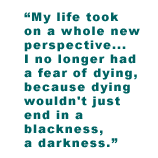For more relaxed reading, get a printer-friendly version
of this article, viewable with Acrobat Reader.
![]()
For more relaxed reading, get a printer-friendly version
of this article,
viewable with
Acrobat Reader.

Off the coast of Maine, there was a Navy ship sailing in a very dense fog. This
night, the midshipman saw a fixed light in the distance and immediately contacted his
captain. "There's a light in the distance heading straight for us, what do you want me
to do?" The captain told him to flash a signal to the vessel, directing it to change
course. The vessel signaled back, "No, you change your course." Again the captain
instructed the midshipman to command the oncoming vessel to change its course
immediately. Again the reply was, "No, you change your course." With one last attempt, the
midshipman signaled the vessel saying, "This is the Captain of a U.S. Navy battleship
and you are to change your course immediately." The reply was, "No, you change
your course. This is a lighthouse."
That story illustrates how we as humans tend to deal with pain and suffering. We always want the circumstances
around us to change course, rather than changing ourselves to meet those circumstances.
My life has been a perfect example of this. I was born with hemophilia, a blood disorder which makes my bones
and joints swell for no reason. Hemophilia is treated with a protein gathered from pools of donated blood. Well,
somewhere between 1980 and 1983, one of the donors to my particular donor pool was infected with the HIV virus. As a result,
all the medications I received from that particular pool (possibly hundreds) were infected with HIV. I also later
contracted hepatitis C the same way.
I actually wasn't told I was HIV positive until 1990, which was my sophomore year of high school. When I was told,
my initial reaction was a fairly common one when we're dealt with something we can't handle. I simply denied that I
was HIV positive and tried to pretend it wasn't there. HIV didn't hurt like hemophilia did. With hemophilia, when your
joints and muscles swell, it is very, very painful. But HIV had no outward symptoms. You couldn't really notice it, so it
was easy to just pretend it wasn't there. That's the way my parents dealt with it, too. "You look good, you look okay, so
you must be okay," they said.
A great example of this kind of denial is in the movie,
Monty Python's In Search of the Holy Grail. In one scene,
King Arthur is trotting through the forest and comes across a knight wearing beat-up, black armor. The knight is blocking
his path, and King Arthur realizes that he's not going to get by unless he defeats the knight in battle. A battle ensues
and King Arthur manages to sever the arm of the black knight. King Arthur sheathes his sword, bows and begins to walk
by, but the knight says, "No!" And King Arthur says, "I cut off your arm!" The knight looks at it and says, "No you
didn't!" So King Arthur looks at the ground and says, "There's your arm right there!" And the knight says, "It's just a
flesh wound." King Arthur realizes that he's going to have to severely maim this guy in order to get by him. So the
battle continues and Arthur severs all the limbs from the knight's body until all that's left of the knight is just a stump on
the ground with a head. As King Arthur trots by, you can hear the knight in the background yelling, "Come back you
coward, I'll bite your knees off!"
I was able to deny that I was HIV positive for about three years. My senior year of high school, however, I got very
sick. I started showing symptoms of the disease. T-cells are the white blood cells that fight infection, and the number of
T-cells you have in your body tells whether you are HIV positive and whether you have AIDS. When your T-cells drop
below 200, you are considered to have full-blown AIDS. Well, my T-cell count was at 213 and dropping. I was very, very
sick and very pale, and I couldn't hold down food. I could no longer pretend my HIV wasn't real--it was very, very real.
Denial was no longer an option, so I had to find a new way to deal with everything I was going through. The first thing
I tried to do was blame someone. I thought I would feel better if someone would walk up to me and say, "Steven, this
is my fault, man. I'm sorry." So initially I decided to blame the entire homosexual community. Easy cop-out. But after
I thought about it, I realized it's kind of stupid to blame an entire group of people for my problem. I then decided to
blame God. Now, I didn't really believe in God at the time, but I figured if anyone has control of the situation, it's got to be
God. So I blamed God.
When you have someplace to focus all of your built-up pain, it turns into anger. And eventually it turns into rage. Now
I began to deal with everything that I encountered by getting mad. Anytime someone said something that just kind
of annoyed me, I'd explode at them. Punching walls. Destroying my room. Things like that.
But I found that anger has the ability to cloud your mind, and it keeps you from acting rationally. Worse, in the process
it hurts those you love. A much better way to deal with pain is to cry, because it doesn't hurt anyone and it feels
really, really good.
Well, on one occasion I was in my room and had reached bottom. I was very sick and had lost a tremendous amount
of weight. I was screaming, swearing at God, punching the walls in my room, and then my dad walked in. He closed
the door behind him. My father is a recovering alcoholic. Through AA he learned about a Higher Power, he learned
about God. My dad looked at me and said, "You know Steve, I can't help you. Your doctors can't help you. Your mom
can't help you. You can't help you. The only one who can help you right now is God." And he walked out of the room
and closed the door.
Now, I had just finished swearing at God, so I didn't think I was quite in the right position to be asking God for help.
But, there I was, with no other choice. I dropped down on my knees, and through my tears I said, "Alright God, if
you're there, you help me and I'll help you." Well, in an extremely short amount of time, I gained all of my weight back. My
T-cell count jumped up to about 365, which is pretty good. And I felt great. I felt great...just like that. And I
thought, "Okay, thank you God. Bye. That was nice. Goodbye."
He had a dyslexia problem. I noticed that when he would study and get to a point of frustration--the point where I
would be punching walls and destroying things--he would just stop, close his eyes, say a prayer, take a breath and go back
to work. That blew me away. I thought, "How can you not break something? You have to break something!" It
really amazed me that he was able to do this.
My roommate invited me to go to spring break with him to Daytona Beach. While there, my friend started talking to
the guy next to us on the beach. At first we started talking about common things, normal stuff. Then my friend decided to
get into some deep, heavy issues. I didn't want to get into that. I had been struggling with a lot. It's tough to know
you're dying at such a young age. And I really didn't want to talk about that stuff with some stranger on the beach, so I kind
of faded out of the conversation. They kept talking, and eventually it got around to the point where my friend tried
to explain what he believed as a Christian. I always had a picture of what a Christian was, but I never actually knew
what they believed or thought. So I kind of listened in on what he was saying.
I don't know if I can explain it quite as well as he did, but he said something like this: "I believe in God, obviously. And
I believe that God created us to be in relationship with him. But we don't want to be in that relationship with him, so
we push him away. That pushing God away, that rebellion--whether it's actively rebelling against him or just
passive indifference--the Bible calls sin. I don't like the word "sin," so I think of it as just pushing God away. And because we
did that, and because we were created to be in a relationship with him, there's a penalty. The penalty for our rebellion
is death, we die. And there's a spiritual death, we're separated from him." I thought,
Oh, that's happy.
So I said, "But God loves us." And he said, "But God is also just. Love without justice means nothing." That didn't
really make sense to me. So he said, "Well, picture the person you care about most in the world, the person you would
immediately give your life for. Then picture yourself pushing that person away and not seeing him again for a long time.
Then one day you see that person fifty yards away, and you go running to him and throw your arms open, but they stop
you and say: 'No, you pushed me away, remember?' Now picture pushing away God, the greatest love in the universe."
And he said, "Then Jesus rose from the dead three days later. He conquered that spiritual death and offers us eternal
life. Now we wouldn't just die, but would then go on to spend eternity with the greatest love in the universe."
And I said, "Wow." "But," he said, "the catch is, even though he offered this and paid the penalty, if you don't accept
his offer...well, it's up to you." I still wasn't really clear on this, and fortunately neither was the other guy. So my friend
said, "Okay, imagine yourself driving down the road out here. You're going 90 and the speed limit is 35. You're flying
down the road and a cop pulls you over and writes you a ticket. To pay the ticket, you have to go to court the next day. As
you walk in the courtroom and look up, you see the judge is your dad. And you think,
Hey, that's my dad. Your dad looks at you and goes, 'Steve, did you break the law?' And you say, 'Yeah.' So he says, 'Okay, $500 fine or two days in jail.'
He hammers down the gavel and that's it.
"Now, because he's just and fair, he had to pass sentence. But then he steps off the judge's bench, takes off his
robe, reaches into his back pocket and hands you $500. Because he loves you, he's going to pay that penalty for you. But
you have to accept the payment. He's standing there with 500 bucks, saying 'Here you go.' Likewise, with God you can
just say, 'No, I'll just spend an eternity separated from you.' It's a choice you have to make."
My friend said the way we accept the payment is through prayer. He said, "You simply accept God's payment. It's
by God's grace. There is nothing you have to do to earn this. It's just a gift from God." This was the first time I ever
heard about grace. He said, "It's a gift that you accept by faith through prayer." And my friend offered to pray with this
guy. And while he prayed out loud, I prayed too, but silently.
From that second on, my life took on a whole new perspective. I no longer had to go to bed every single night
worrying about whether I was going to be alive the next day. I no longer had a fear of dying, because dying wouldn't just end in
a blackness, a darkness. Now when I die I would spend an eternity, forever, with the greatest love in the universe. It was
so freeing.
My parents accepted the payment as well. They prayed to God as I had done. And their lives, too, have taken on a
totally new perspective. It's amazing to think that they would let me travel away from them, knowing I would probably
have only six months to live. And you can imagine how difficult it's been for them to just stand there with their hands by
their side and just watch as their son dies in front of them. There's nothing they can do. But now the only reason they can
deal with that, and the only reason I can handle it, is that we each have Christ in our lives.
So I'm going to pray a prayer. Prayer has nothing to do with closing your eyes or bowing your head or folding
your hands or shouting "Alleluia!" Nothing like that. It's an attitude of your heart. It is saying to God, "God, I've broken
the law. I've pushed You away. And I want to come back by accepting Your payment." If you feel like you need that,
please pray this prayer right now. "Lord Jesus, I need You. I thank You for dying on the cross for me. I ask that You come
into my life and make me the kind of person I've always wanted to be. Amen."
Now, if you just sincerely prayed that prayer, you've begun the greatest relationship you can ever have--a
relationship with God. And it doesn't stop with a prayer. A relationship with God is a process. It means daily trusting God, trying
to do not necessarily what you want or what feels good, but what you think God wants you to do. I've had people say to
me, "Christianity works for you and that's great. Couldn't other religions work for other people?" That's a good question.
I believe God gave us one way to come to Him--through Jesus' death on the cross--even though there's an element of
truth in other religions. They are largely moral codes--"Do this seven times a day and this will bring you closer to God." But
if you're trying to work toward God, how much work is enough? How do you know when you've reached that point?
I think that's where Christianity find its truth: in the grace of God. Knowing we can never reach God's perfection, we
can rely on God's forgiveness. The goal is to walk in His path, even though we will screw up a lot. You make mistakes,
but you keep going, you keep working at it, trusting in God's grace. You pray. You read the Bible. You find out what
God wants from you. Someday you'll reach peace. It may not be until you reach heaven, but then it's forever.
Steve Sawyer died of liver failure from hepatitis C on March 13, 1999. He spent his remaining years speaking on hundreds of college campuses,
even though the traveling compounded the pain of his illnesses. In the last days of Steve's life he said he wanted to speak to "just one more campus."
Why? "If I had to get these diseases that are killing me for that one person to understand that they can have a relationship with Christ, then it is worth it.
In light of eternity, that is all that matters."
From the Bible... "We all, like sheep, have gone astray, each of us has turned to his own way; and the LORD has laid on
him the iniquity of us all." (Isaiah 53:6) "For God so loved the world that he gave his one and only Son, that whoever believes in him shall not
perish but have eternal life." (John 3:16) "Whoever hears my word and believes him who sent Me has eternal life and will not be condemned; he
has crossed over from death to life." (John 5:24) "Where, O death, is your victory? Where, O death, is your sting?" (1 Corinthians 15:55) In the early 1980s, Steve Sawyer, a hemophiliac, contracted the HIV virus and hepatitus C from unscreened
blood supplies. Years later, at 19 years old, knowing his death was imminent, Steve used his remaining years traveling to hundreds
of college campuses, sharing with students what he learned about living with hope and peace in the midst of
terrible circumstances. Thousands of the students who heard Steve would tell you that his message about hope and God's love changed
their lives forever. The following edited talk is one Steve gave at the University of California, Santa Barbara.
In the early 1980s, Steve Sawyer, a hemophiliac, contracted the HIV virus and hepatitus C from unscreened
blood supplies. Years later, at 19 years old, knowing his death was imminent, Steve used his remaining years traveling to hundreds
of college campuses, sharing with students what he learned about living with hope and peace in the midst of
terrible circumstances. Thousands of the students who heard Steve would tell you that his message about hope and God's love changed
their lives forever. The following edited talk is one Steve gave at the University of California, Santa Barbara.
 Well, needless to say, that knight was in denial. He couldn't face the fact that he had lost the fight. And although that's
a humorous example of denial, the dangers of denial are very, very real. If I had continued to deny the fact that I was
HIV positive, I might not have taken the right precautions with little cuts on my fingers or things like that, and I could
have severely hurt or even killed someone. But the dangers to yourself when you deny something like that are also
very dangerous and very painful. When you push something down for that long, and you try to pretend it's not there, it
builds up. And eventually it explodes.
Well, needless to say, that knight was in denial. He couldn't face the fact that he had lost the fight. And although that's
a humorous example of denial, the dangers of denial are very, very real. If I had continued to deny the fact that I was
HIV positive, I might not have taken the right precautions with little cuts on my fingers or things like that, and I could
have severely hurt or even killed someone. But the dangers to yourself when you deny something like that are also
very dangerous and very painful. When you push something down for that long, and you try to pretend it's not there, it
builds up. And eventually it explodes.
 I graduated and went off to college to take my placement test the summer before my freshman year. This was when I
met my roommate. I got there and finished the test, and there was this tall, skinny blonde kid standing there. He said,
"Hey, you look normal. Want to be my roommate?" And I thought,
Well, okay, you don't, but..."Sure." We became
roommates, and actually we became best friends. I found out that my roommate was a Christian. At the time I had this picture of
what a Christian was. To me a Christian was a hypocritical, condescending, condemning person. That's all a Christian
would ever be to me, I thought. But my roommate was different.
I graduated and went off to college to take my placement test the summer before my freshman year. This was when I
met my roommate. I got there and finished the test, and there was this tall, skinny blonde kid standing there. He said,
"Hey, you look normal. Want to be my roommate?" And I thought,
Well, okay, you don't, but..."Sure." We became
roommates, and actually we became best friends. I found out that my roommate was a Christian. At the time I had this picture of
what a Christian was. To me a Christian was a hypocritical, condescending, condemning person. That's all a Christian
would ever be to me, I thought. But my roommate was different.
 And I thought, "Wow. That's not good." And he said, "Well, it doesn't end there, fortunately. Because God loves us
so much and cares about us so much, he decided to pay the penalty for us. He sent his Son, Jesus, to die on the cross in
our place. And because Jesus (being God in the flesh) lived a sinless life, he could pay the penalty for someone else. He
paid it for us."
And I thought, "Wow. That's not good." And he said, "Well, it doesn't end there, fortunately. Because God loves us
so much and cares about us so much, he decided to pay the penalty for us. He sent his Son, Jesus, to die on the cross in
our place. And because Jesus (being God in the flesh) lived a sinless life, he could pay the penalty for someone else. He
paid it for us."
 Can I give you the chance to accept God's payment for you? If you had the cure for AIDS, I'm sure you would offer it
to me. I know how to get to eternity, that it's a gift from God. So I'm trying to offer it to you. If you are going
through something that you just can't handle on your own, and you would like someone there who will stand by you and pick
you up when the whole world is kicking you and stabbing you in the back, then I ask you to please pray a prayer with
me right now. This won't be some magic phrase or incantation. And it's not a big emotional trip or thought. Rather,
it's beginning a relationship with God. And just like any relationship, it takes time. It takes effort. But I urge you: if
you really feel like you need this, don't pass up the opportunity. It's free.
Can I give you the chance to accept God's payment for you? If you had the cure for AIDS, I'm sure you would offer it
to me. I know how to get to eternity, that it's a gift from God. So I'm trying to offer it to you. If you are going
through something that you just can't handle on your own, and you would like someone there who will stand by you and pick
you up when the whole world is kicking you and stabbing you in the back, then I ask you to please pray a prayer with
me right now. This won't be some magic phrase or incantation. And it's not a big emotional trip or thought. Rather,
it's beginning a relationship with God. And just like any relationship, it takes time. It takes effort. But I urge you: if
you really feel like you need this, don't pass up the opportunity. It's free.
© 2000 www.everystudent.com. Used by permission.
Photos by Guy Gerrard and Tom Mills © Worldwide Challenge